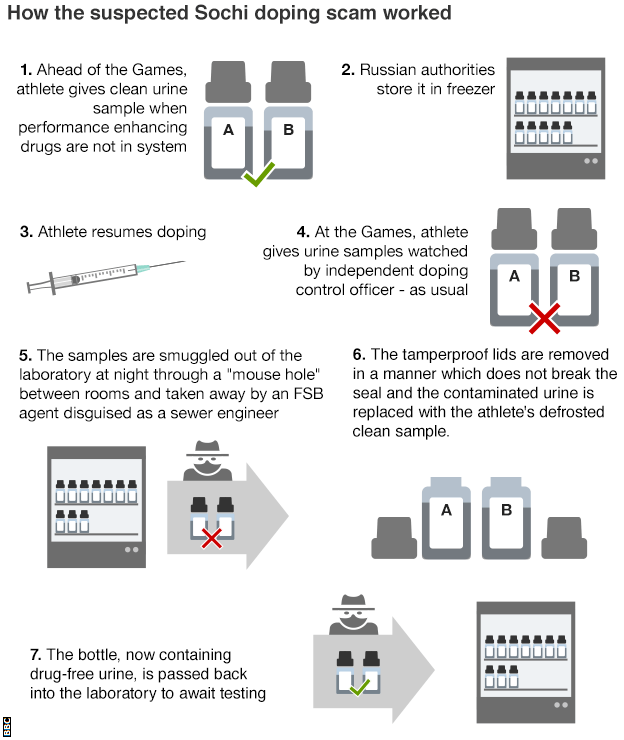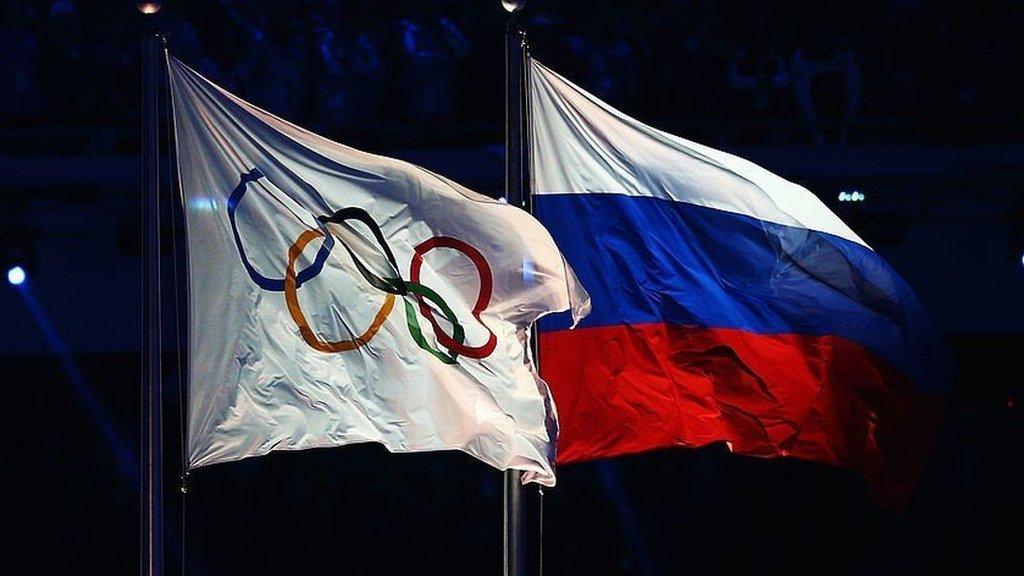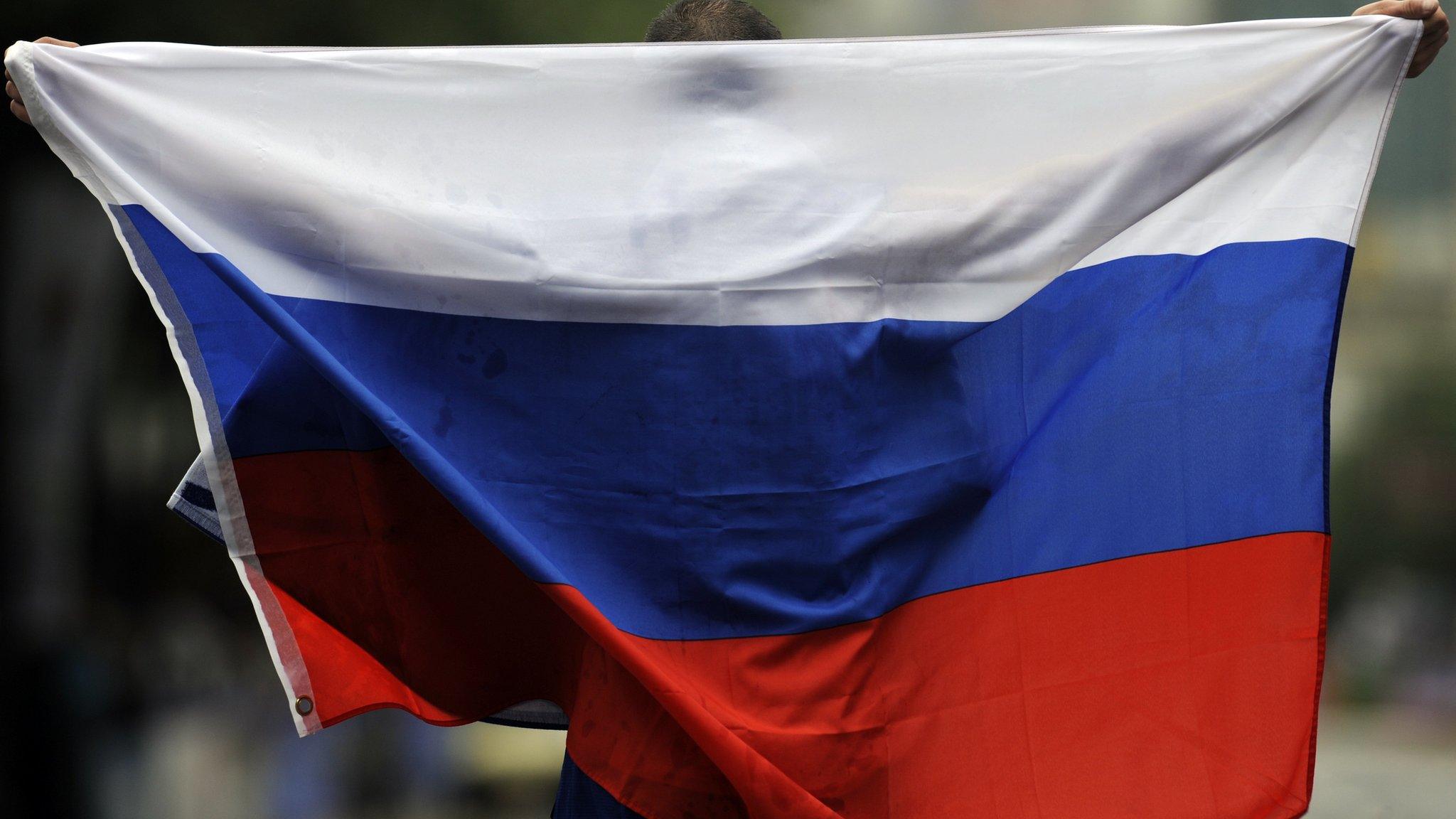Winter Olympics 2018: Anti-doping organisations demand Russia ban
- Published
'Russia compliance reviewed by November'
Seventeen national anti-doping organisations have demanded Russia is banned from the 2018 Winter Olympics.
Less than five months before the start of the Pyeongchang Games, the group said the International Olympic Committee's (IOC) "refusal to hold Russia accountable for one of the biggest scandals in sports history... imperils clean athletes and the future of the Olympic movement".
The Nados, which includes the UK and US anti-doping agencies, said the country must be punished "for proven corruption of the Sochi 2014 Games and continuing failure in its obligations to clean sport".
They also warned they had "serious doubts" that Pyeongchang 2018,, external which takes place from 9-25 February, would be clean.
Last year, an independent report commissioned by the World Anti-Doping Agency (Wada) found evidence of state-sponsored doping in Russia, for which the IOC is yet to decide on sanctions.
Two commissions set up in December have still not concluded, with speculation that Russia could face a heavy fine and escape a ban.
IOC vice-president John Coates said his organisation was acting as quickly as possible, but needed to gather all of the evidence.
"We would love all of this to be concluded well in advance of Pyeongchang and still hope that's the case," he said.
He also rejected a suggestion it is preparing to let Russia off the hook with a fine.
"That's not right. We want this wrapped up as soon as possible, we want to deal with what has happened in the past and make sure it doesn't happen again," Coates added.
Background
Canadian law professor Richard McLaren's 144-page independent study concluded more than 1,000 Russians benefitted from the doping programme across 30 sports.
As a result, Wada recommended all Russian athletes be banned from competing in the Rio 2016 Olympic Games.
But the IOC chose not to impose a blanket ban, instead leaving decisions on whether Russians could compete to individual sporting federations. In total, 271 Russians competed in Rio.
'Serious doubts the 2018 Games will be clean'
Dan Roan reports from the discredited Moscow anti-doping laboratory
"The IOC needs to stop kicking the can down the road and immediately issue meaningful consequences," the Nado leaders said following a two-day meeting in Denver.
"We have serious doubts that the 2018 Games will be clean due to the incomplete investigation of massive evidence of individual doping by Russians athletes at the 2014 Sochi Olympic Games and given the inadequate testing evidence of Russian athletes over the past four years."
Earlier this week the New York Times revealed that of 96 cases among athletes implicated in the Russian doping programme, 95 have been closed due to a lack of hard evidence.
"Those appear to have been shut prematurely before the IOC or international federations have obtained complete evidence from the Moscow laboratory or interviewed the relevant witnesses" the Nado leaders said.
"The mishandling of this Russia doping crisis has left the athletes of the world wondering if global anti-doping regulations have teeth and whether their fundamental right to clean sport matters."
They demanded that Russia accept McLaren's findings, and grant full access to samples from the Moscow laboratory.

"The IOC and Wada must insist that Russia turn over this key additional evidence. A full account and justice for clean athletes cannot be achieved without this information," the Nado leaders said.
"The failure to properly investigate and prosecute free of sport-political influence those who violated anti-doping rules, breaks the trust with millions of clean athletes around the world. This dereliction of duty sends a cynical message that those of favoured, insider nations within the Olympic movement will never be punished or held accountable, violating the fundamental covenant of fairness on which sport is based.
"It's time for action. Athletes want to see results - not more lip service - that actually support their decision to compete clean."
This week, Wada said Russian compliance with their rules could happen as soon as next month, opening the door for the IOC to allow the country to compete at the Winter Games.
This week, Russia's deputy prime minister, Vitaly Mutko, blamed Russia's anti-doping agency (Rusada) and the former head of the Rusada lab, Grigory Rodchenkov, for the corruption, and suggested Wada was at fault, too. Rodchenkov lives in hiding in the United States after revealing details of the plot.
"We are rearranging the system, but it should be rearranged so that Wada could also share responsibility," Mutko told Russia's R-Sport news agency.
National anti-doping organisations to demand Russia ban:
Austria, Australia, Canada, Denmark, Finland, France, Germany, Ireland, Japan, Netherlands, New Zealand, Norway, Singapore, Sweden, United Kingdom, USA, plus the Institute of National Anti-Doping Organisations
- Published25 July 2016

- Published18 June 2016
